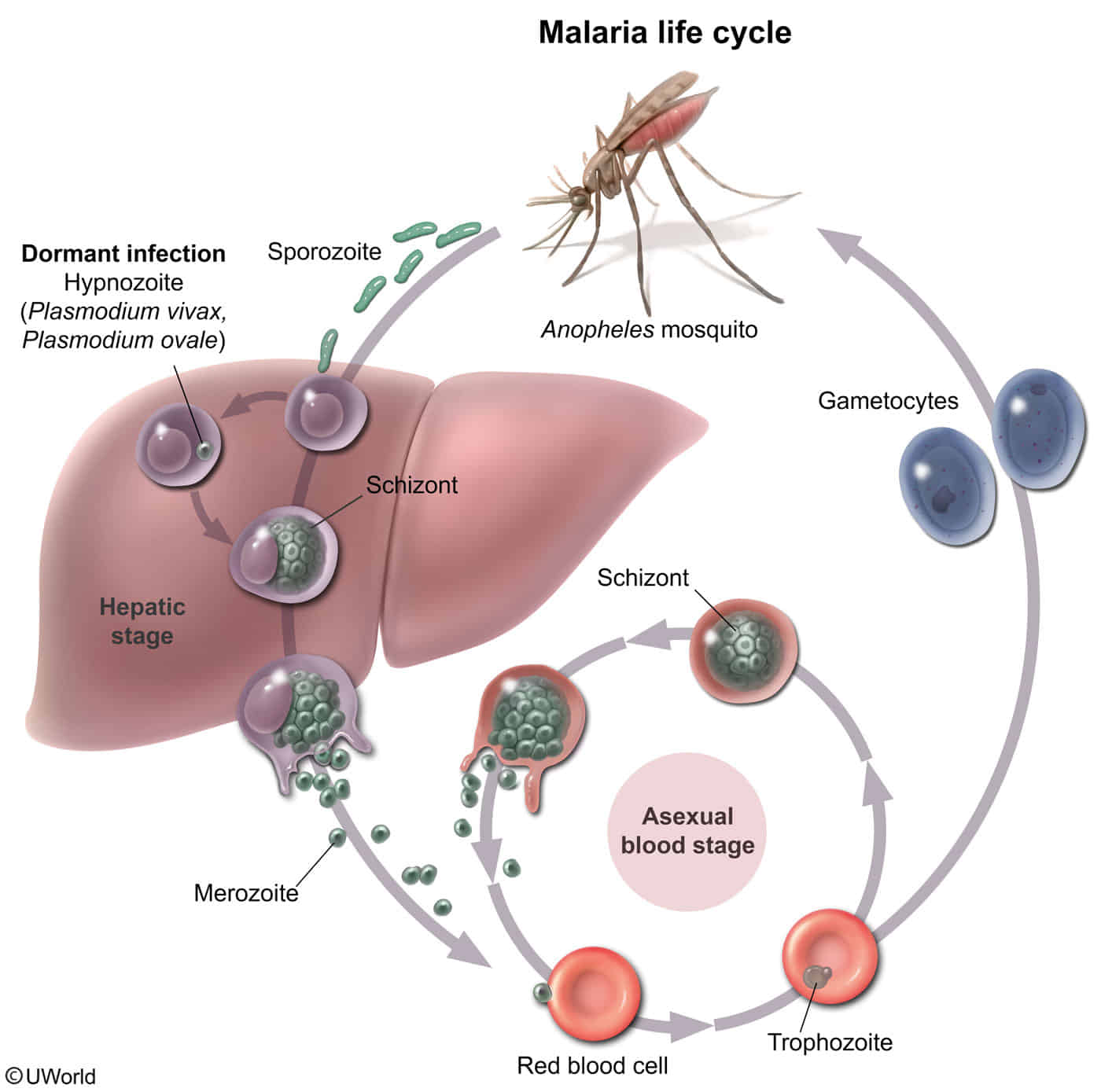Epidemiology
Etiology
- Pathogen: Plasmodia
- Plasmodium falciparum: most virulent and causes the most severe disease, i.e., falciparum malaria; dominant in Africa
- Plasmodium vivax and Plasmodium ovale primarily infect very young, large erythrocytes recently released from the bone marrow (ie, reticulocytes), whereas Plasmodium malariae primarily infects old erythrocytes that have been in the bloodstream for months. In contrast, Plasmodium falciparum has the unique ability to infect erythrocytes of all ages.
- No hypnozoites; recrudescence may occur due to treatment failure, not true relapse.
- Plasmodium vivax: the most common of the less virulent species and causes milder disease; dominant in endemic areas outside Subsaharan Africa (e.g., Southeast Asia)
- Plasmodium ovale and Plasmodium malariae: less common and cause milder disease
- Plasmodium falciparum: most virulent and causes the most severe disease, i.e., falciparum malaria; dominant in Africa
Pathophysiology
Asexual development in humans

- Transmission of Plasmodium sporozoites via Anopheles mosquito bite → sporozoites travel through the bloodstream to the liver of the host
- Liver: sporozoites enter hepatocytes → sporozoites multiply asexually → schizonts are formed containing thousands of merozoites → release of merozoites into the bloodstream
- Circulatory system (two possible outcomes)
- Merozoites enter erythrocytes → maturation to trophozoites → red cell schizonts are formed containing thousands of merozoites → release of merozoites into the bloodstream (which causes fever and other manifestations of malaria) → penetration of erythrocytes recurs
- Merozoites enter erythrocytes → differentiation into gametocytes (male or female)
- Following the successful treatment of tertian malaria, dormant P. ovale or P. vivax forms (hypnozoites) may remain in the liver and can cause relapse after months or even years.
Clinical features
Diagnostics
Treatment
Antimalarial drugs
- Primaquine is the only antimalarial that attacks the hypnozoites, preventing relapse
Plans
- P. vivax, P. ovale (tertian malaria)
- Chloroquine OR hydroxychloroquine
- PLUS antirelapse treatment: primaquine (伯胺奎) OR tafenoquine
- Uncomplicated falciparum malaria
- No chloroquine resistance
- Chloroquine OR hydroxychloroquine
- With chloroquine resistance
- Artemether-lumefantrine
- OR atovaquone‑proguanil (阿托伐醌/氯胍)
- OR mefloquine
- No chloroquine resistance
- P. malariae (quartan malaria)
- Chloroquine or hydroxychloroquine
Prevention
- Should be initiated before traveling to regions with a high risk of malaria, e.g., tropical Africa, Asia, and Central/South America
- Drug of choice is based on the region traveled and Plasmodium species
- Areas with P. falciparum
- If chloroquine-resistant P. falciparum (most malaria endemic regions): atovaquone-proguanil, doxycycline, mefloquine
- If chloroquine-sensitive P. falciparum: chloroquine
- Areas without P. falciparum (some areas of Central/South America, Mexico, China, South Korea): primaquine
- Areas with P. falciparum
- Agents that are safe during pregnancy: chloroquine, mefloquine
Tip
Prophylactic medication cannot prevent infection but instead suppresses the course of the disease and its symptoms by killing the parasite within the host before it can cause severe disease. There is no prophylactic medication that provides protection against all species of the Plasmodium genus.